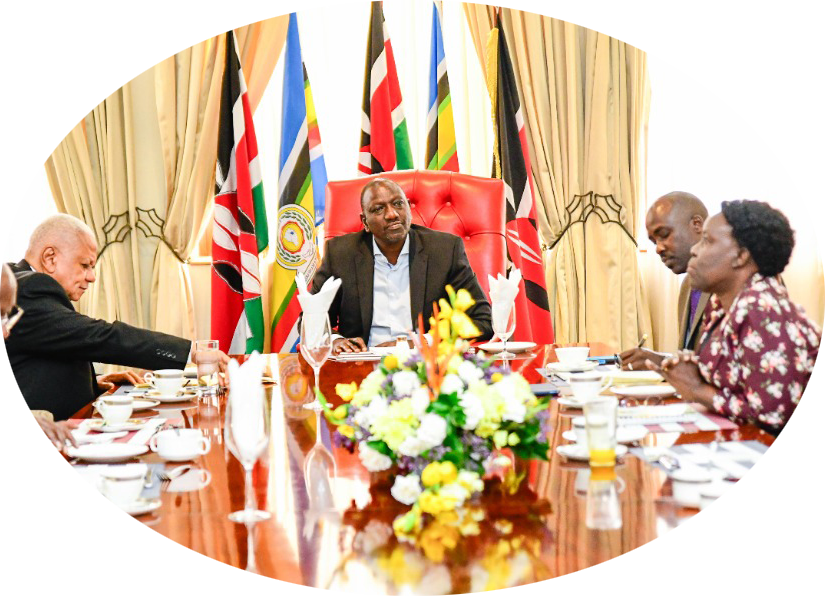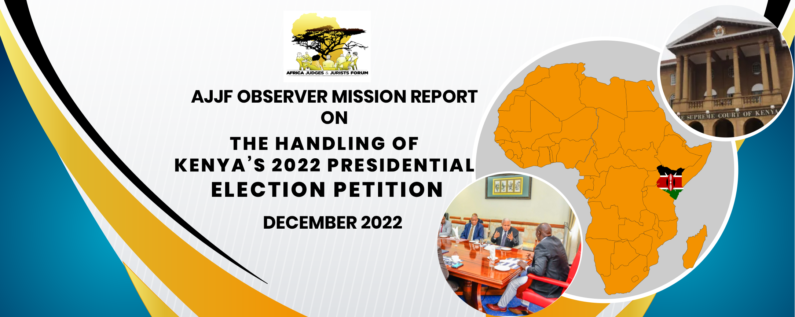Background
On 10 February 2023, the Africa Judges and Jurists Forum (AJJF) launched a report detailing the findings of its High-Level Observer Mission on the handling of the 2022 Presidential election petition by the Supreme Court of Kenya. This follows the deployment of a team of eminent African judges and jurists in August 2022, to monitor and observe the proceedings at the Supreme Court of Kenya on the handling and determination of the 2022 presidential election petition.

Headed by Retired Chief Justice of the Republic of Tanzania Mohammed Chande Othman, the Observer Mission comprised of Justice Henry Boissie Mbha of the Supreme Court of Appeal and immediate past President of the Electoral Court of South Africa; Justice Moses Chinhengo, AJJF Chairperson and Acting Justice of the Court of Appeal of Lesotho and former Judge of the High Court of Zimbabwe and of Botswana; Lady Justice Lillian Tibatemwa-Ekirikubinza of the Supreme Court of Uganda; and Lady Justice Ivy Kamanga of the Supreme Court of Appeal of Malawi.
The purpose of the Observer Mission was to assess whether these proceedings were being handled in a manner that adheres to regional and international standards relevant for the handling of election disputes. In particular, the Observer Mission sought to assess whether the Supreme Court handled the proceedings in a manner which adheres to the right to fair hearing for the parties involved in the petition. The Observer Mission did not examine the election process itself, but only confined its review to the manner in which the Supreme Court handled proceedings concerning the hearing and determination of the presidential election petition. The Mission did not evaluate the evidence before the Court or assess the application of jurisprudence by the Supreme Court in that petition, as its mandate was limited to assessing whether the process of handling the petition adhered to international and regional standards as they pertain to the right to a fair hearing.
Summary of the Mission’s Findings
The main international and regional instruments which guarantee the right to a fair hearing are Articles 8 and 10 of the Universal Declaration of Human Rights, article 14 of the International Covenant on Civil and Political Rights (ICCPR) and articles 7 and 21 of the African Charter on Human and Peoples’ Rights. Elements of the right to a fair hearing in respect of resolution of election disputes are also protected in article 17(2) of the African Charter on Democracy, Elections and Governance (ACDEG). Kenya has signed and ratified these instruments.
The right to fair hearing includes the following key elements: the right to access an independent tribunal; the right to legal representation; the right to be treated equally before the court and law; the right to prepare and present a case and defense; the right to a public hearing; the right to an expeditious hearing and the right to be given adequate reasons for the decisions made by the tribunal.
a. The right to consult and be represented by counsel of one’s choice
The right of each party to legal representation was fully respected and honoured by the Supreme Court of Kenya as each party was allowed to appoint and be represented by legal counsel of choice. However, due to the limited space available, restrictions were imposed on the number of legal counsels who could sit with the parties in the main court room. The Court issued directions stipulating the number of legal counsels who would be permitted to sit in the main court room. Each party was allocated an equal number of lawyers who could sit and consult with the parties in the main court room, while the rest of the legal counsels were allocated an overflow court room. These restrictions on the number of legal counsel who could sit in the main court room were consistent with article 14 of the ICCPR and article 7 of the African Charter which permit restricted access to the court room in the interests of orderly administration of justice. The fact that each party was allocated equal number of legal counsels who could sit in the main court room is consistent with the right of parties to be treated equally before the court in line with articles 14 of the ICCPR and 3 of the African Charter.
b. The right to a public hearing
The right of the parties to have the election petition adjudicated through a public hearing was respected and honoured by the Supreme Court of Kenya. Due to limited space available in the court room, only the parties, accredited media and legal counsel were permitted to physically attend the court proceedings. However, adequate measures were undertaken to ensure that the hearing would be conducted in full view of the public. For instance, the proceedings were broadcasted on various radio and television stations with national and international coverage. They were also livestreamed on various social media platforms, including Facebook, You Tube and Twitter. The Supreme Court provided a detailed schedule, outlining the dates and times during which the various proceedings were to be held, and this enabled the public and the media to follow the proceedings using various online and live broadcasting channels. Therefore, although the public could not access the court room physically, they were able to follow the proceedings and thus, the hearings were conducted in full view of the public in compliance with article 14 of the ICCPR and article 7 of the African Charter.
c. Right to equality before the law
In terms of article 14(1) of the ICCPR and article 3 of the African Charter, parties must be treated equally before the court. The Mission is of the opinion that this right was respected by the Supreme Court. After filing their written submissions, each party was given an opportunity to make their oral submissions and to respond during the hearings. The Court set aside three days for the hearing. A full day was allocated to the petitioners to make their oral submissions while another full day was allocated to the respondents. The third day was dedicated for rejoinders. Throughout the hearing, the Mission observed that judges sufficiently engaged with each party’s submissions. Restrictions on the number of legal counsels who could sit in the main room were equally applied on the parties as each party was allocated an equal number of legal counsels who could sit in the main court room.
However, the Mission noted that the legal framework does not accord equal time for Petitioners and Respondents to prepare and file their initial submissions. In terms of Article 140 (1) of the Constitution of Kenya, while the petitioners have seven days from the date of declaration of the result to file a petition, the respondents [and amici]have only four days to file their responses. Therefore, the petitioners have more time to prepare their initial submissions while the respondents have less time. This undermines the principle that all parties must be treated equally, including being given equal opportunity to prepare and present their cases. However, this is an issue which cannot be addressed by the Supreme Court. It is the mandate of the legislature to relook into this and assess if there is a need to amend the legal framework to ensure that petitioners and respondents have equal time to prepare and present their initial submissions.
d. Right to access an independent tribunal established by law
Article 140(1) of the Constitution of Kenya mandates the Supreme Court to hear and decide petitions challenging the results of presidential elections. The petitioners in the 2022 case filed their petition before the Supreme Court, and their petition was heard and decided by the judges of the Supreme Court.
The Mission did not observe anything which suggests subversion of the independence of the judges who presided over the petition. The Mission noted reports (caried mainly on social media) suggesting that some of the judges had resigned or had been compromised by parties to the case. However, none of these reports have been substantiated so far. The Mission also observed that the judges conducted themselves impartially. While delivering the summary judgment, the Deputy Chief Justice indicated that some of the lawyers had made attempts to call the judges prior to the delivery of the judgment. The judges declined those calls, in order to safeguard their independence and to maintain public confidence in the independence of the Court.
e. Right to adequate opportunity to prepare, present and challenge evidence
All the parties were given an opportunity to file their written as well as make oral submissions during the hearing. They were given an opportunity to respond to arguments made by the opposing parties and challenge the evidence adduced. However, the Mission noted that the Constitution sets a strict timeframe within which the proceedings must be concluded, and the petition be determined. Article 140 (2) of the Constitution stipulates that “Within fourteen days after the filing of a petition under clause (1), the Supreme Court shall hear and determine the petition and its decision shall be final.” This timeframe may not be enough to give the parties adequate time to prepare their cases and responses. However, this is an issue which cannot be addressed by the Supreme Court. It is the mandate of the legislature to relook into this and assess if there is a need to amend the legal framework and provide for a longer timeframe.
f. Right to an expeditious hearing
Under article 14 of the ICCPR and article 7 of the African Charter, parties have a right to have their legal dispute determined by an independent court within a reasonable time and to be given reasons for the decision(s) made by the court. This right was fully respected by the Supreme Court of Kenya. The Court conducted hearings and delivered its judgement within 14 days days as stipulated in article 140(2) of the Constitution, and thus there were no delays. The Court dismissed the application and delivered a summary judgement which outlines reasons for its verdict. The Court delivered its full judgment on 26 September 2022.
Conclusion
In conclusion, the Mission found that the Supreme Court complied with all the relevant regional and international standards on the right to fair hearing. However, Africa Judges and Jurists Forum urges the Kenyan legislature to look into whether the time frame allocated within which legal papers should be filed can be amended to accord Applicants and Respondents equal time to prepare their legal papers. Africa Judges and Jurists Forum also encourages the Kenyan legislature to examine whether the strict timeline of 14 days imposed by the Constitution for the Supreme Court to hear and determine the petition is adequate to permit judges to thoroughly deal with all the issues raised in a potentially complex matter such as a petition challenging the results of a presidential election. The full report by Africa Judges and Jurists Forum can be accessed here

